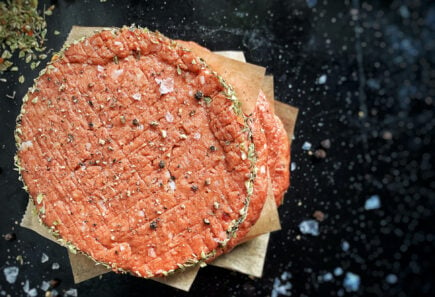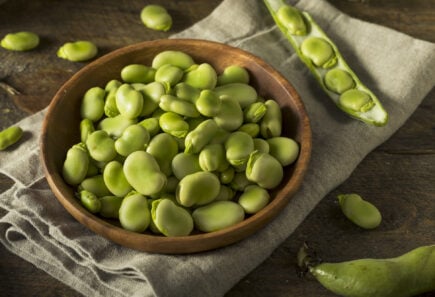Project aims
This project aims to use fiber melt spinning, a technology used in textiles and plastics, to mimic intramuscular fat marbling for plant-based meat. This would provide a scalable, cost-effective method of mimicking whole-cut animal meats. The project also assesses the rheology of plant-based formulations and optimizes them for fiber spinning.
This work will develop lean cut plant-based beef products and will ultimately inform strategies to scale production of other whole-cut alternative proteins.
Principal researcher

Dr. Jay Park
Assistant professor, University of Massachusetts Lowell, USA
Dr. Park has expertise in advanced polymer fibers, polymer physics, electrospinning, and fiber process-structure properties. He has filed patents on novel gel-electrospinning processes for polymer nanofibers and applications of ordered porous nanofibers.

Page
Research grants
Learn about cutting-edge alternative protein research funded by GFI. Find funding opportunities for your own research.
View related grant projects

Self-aggregating proteins
Learn about Dr. Lutz Grossmann’s research to use self-aggregating proteins to develop a low-energy extrusion process for whole-cut plant-based meats at UMass Amherst.

Stacking plant protein sheets
Learn about Dr. Hanry Yu’s research to recreate the texture of thick animal meats by stacking layers of plant protein sheets at A*STAR.

Functional protein fractions
GFI grantee Ms. Miek Schlangen is making functional protein fractions for plant-based meat at Wageningen University in The Netherlands.

Texturizing proteins and fiber
GFI grantee Dr. Girish Ganjyal at Washington State University is texturizing proteins and fiber to make better plant-based meat.
Explore research opportunities
-
Cultivated
-
Fermentation
-
Plant-Based
Consumer and sensory research to guide alternative fish R&D
Consumer and sensory research can help companies and academic researchers better understand seafood consumers’ needs and desires. Understanding consumers’ needs will allow alternative fish researchers to ask and prioritize the…
-
Cultivated
-
Fermentation
-
Plant-Based
Catalog of animal meat flavors
Creating a catalog of molecules responsible for the characteristic flavor of a species will enable alternative protein product manufacturers to create products that more accurately replicate the sensory experience of…
-
Cultivated
-
Fermentation
-
Plant-Based
Optimizing fat profiles for nutritional and sensory properties
Because alternative meat’s fat content and fatty acid profile can be more easily controlled than conventional meat’s, there is an opportunity to alter fat content for nutritional benefits. Additional research…
Check out related resources

Advancing solutions for alternative proteins
Explore commercial whitespaces, research gaps, technological needs, and investment priorities at each stage of the alternative protein value chain.

The science of plant-based meat
Learn about the science of plant-based meat. Discover resources and research on the latest technological developments and key scientific questions.

Collaborative Researcher Directory
Use this directory to find scientific collaborators in the alternative protein field.

